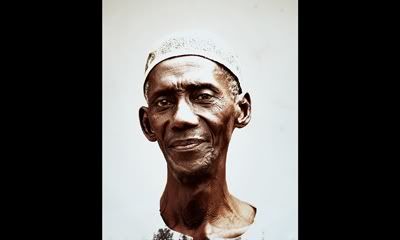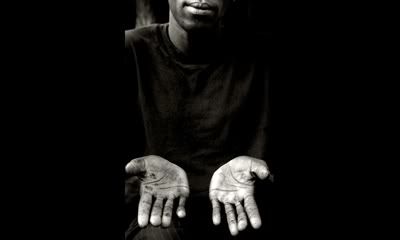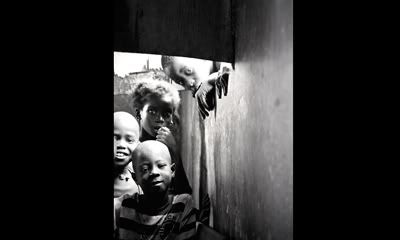Once a month the mailman brings me an oversized white envelope. I still don't know why or how these envelopes end up in my mailbox, but each time they do I am sent into a bit of a daze after reading through their contents. The envelope is from the Voice of the Martyrs, and it contains a monthly publication with stories of persecution and suffering happening to Christians around the world. Most of them sound straight out of the New Testament, only these stories are current and happening to our brothers and sisters today. There is no way to brush these off. They are as tangible as the evening news...but you will never hear these stories on the evening news.
That's why I wanted to share this story. It's incredible.
Given away by his family to a local imam at a very young age, Abdulmasi was raised on a steady diet of Islam and hatred for Christianity. His story is like that of millions of young Islamic boys who are currently being educated in Quranic schools around the world, especially in Nigeria and other West African countries. Many of those schools are training grounds for Islamic militants. but as Abdulmasi's story shows, God can use anyone for his plan, and Abdulmasi was no exception. he ecsaped the darkness of radical Islam to become a witness for Christ to the Muslim world.
In the 1970's, when Muslims wanted to get rid of Christians, they usually called on man - Abdulmasi. An expert in car bombs, riot planning and infiltrating Christian organizations, Abdulmasi was the James Bond of Islamic terrorism.
"I was called Mr. Insecticide," he says. "I was the only one who could organize the killing of insects, the killing of Christians. When you are looking for someone to get rid of insects, then you call me, then I arrange and plan an attack against Christians. This was my life."
Abdulmasi is among the thousands of Muslims around the word raised to be enemies of Christians. At age 5, Abdulmasi was forced into almajiri, an antiquated Islamic practice popular in West Africa of sending you boys away from their families to a local imam, or Muslim teacher. A boy doing almajiri may join 40 or 50 other young boys in the imam's care. Their days are as rigid as those of prisoners.
In the morning, the boys recite the Quran. It is in Arabic, a language they do not understand. They recite for hours, for years, until they memorize the Quran. Imagine going to school every day and being forced to recite the Bible from Genesis to Revelation in Chinese, never having read it in English. Couple that with intense poverty, hunger, thirst and no parental love or guidance, and you have some idea of what the life of an almajiri boy is like.
Around 1 p.m. each day, the boys walk the streets and beg for food. Whatever food or money they get they must share first with the imam. By 2 p.m., they are back reciting and learning the Hadith.
If the Quran is the instruction manual for Muslims, the Hadith are the rule books. The Hadith are a collection of sayings ascribed to the Prophet Mohammed written by Islamic scholars starting in the ninth century. In fundamentalist sectors around the world, the Hadith is where young boys learn the concepts of jihad, paradise and killing enemies of Allah.
Though the Quran tells of Jesus Christ's virgin birth, death and ascension into heaven, it was in the Hadith that Abdulmasi first heard the words "Christian" and "infidel" together. Neither word appears in the Quran.
"It's teaching of hatred, and hatred and nothing more than hatred," Abdulmasi said. "If there is any evil in society...they will relate is as a result of the Christians."
For more than 10 years, Abdulmasi lived on a steady diet of hatred for Christians. This nutrition of hate was his only consistency in a world filled with poverty, illiteracy and child abuse. His only solace was the hope of someday achieving a concept he could not fully grasp called paradise.
The Hadith presents paradise as a place where you get everything you could not get on earth. If you were hungry, paradise is a buffet. If you were thirsty, paradise is a place with wine. So the vision of paradise changes depending upon what you desire. But the way to paradise always remains consistent: "If I can kill the enemy of Allah, then definitely I'm going to paradise," Abdulmasi says.
So at age 17, seeking desperately to escape his life of poverty and see some type of paradise, Abdulmasi participated in his first jihad against Christians near the city of Bauchi. The jihadists did not touch the women or children, but beat and slashed the men.
Abdulmasi recalls one of his victims in Bauchi, "I began beating his legs so he couldn't run away. He fell down and my boys, they attacked him, trying to kill him. I'm sorry to say, but a seven-year-old boy was the one that slaughtered...the man with a knife. Pressing down on his neck, he cut him. They called the boy...Chief Slaughterer."
After the killing, Abdulmasi rejoiced. "You see when you do this," he says clapping his hands together, "and you kill a mosquito, you have achieved something. You smile even though you see blood on your hands. This is the same way of expressing how I felt that time. I felt that I had gotten rid of the enemy of God, my enemy too."
Years of Hadith convinced Abdulmasi that a Christian life is no more valuable than a mosquito's. He continued to participate in riots. The more he participated, the more praise he received. He joined Jama'atu Nasril Islam (JNI) which he calls a fanatical group. When Muslims felt the Christians encroached on Muslim land in northern Nigeria, Abdulmasi would get a phone call.
After bombing a church, Abdulmasi liked to go back to the church to see the effect of his handiwork. On one visit, he found the church members worshipping in the ashes of the destroyed building. "This made my mind bitter!" he says. "I would go back to the mosque and say these people are terrible, you think they are regretting but they are not. They are rejoicing! They are happier."
Abdulmasi was frustrated that the Christians would not leave. He decided the only way to eradicate Christians was to infiltrate a church. It was then that he became aware of the Holy Spirit and the Lord's grace - and his life's story changed.
Abdulmasi approached a church and told the pastor the magic words: "I'm a Muslim but I want to become a Christian." "They loved me," Abdulmasi says. "They really embraced me so much. The love I was shown surprised me."
After that day, Abdulmasi began to attend church like a true believer. He joined the young adult group and went to baptism class. Although he went through with baptism, he was still secretly going to the mosque to pray and fast.
For six years Abdulmasi lived this double life, a life that left little time for anything more than pursuing jihad. He had no wife. He had no children. He had no education. He had family, but he remained cut off from them.
"I was blinded," he says. "I didn't really feel anything because all my sense of feeling was gone, my conscience was sealed. This is before I understood my relationship with my Creator. I took God as a man. I didn't know much about God. I was thinking He could never forgive me or forget what I had done."
The church planned a huge conference and invited a prominent speaker. Abdulmasi went and sat among 2,000 other young adults listening to the pastor speak. For three days he listened. On the last day of the conference, the pastor spoke from 1 Kings 18, on Elijah's challenge to the prophets of Ba'al.
"How long are you going to waver between two opinions?" the pastor thundered. "If God is God, worship Him. If Ba'al is god, worship him." Abdulmasi's ears perked up. He looked at the speaker's face. "Waver between two opinions," he thought. He shook his head.
"Who are you deceiving?" the pastor shouted. "How long now since that day you said you have accepted Christ and you have not been serious? Look, if Ba'al is god, worship Ba'al. But if God is God, worship God. Why are you playing a double game?"
Abdulmasi began to panic. "This man knows about me," he thought. "Who told him about me? Soon he will call my name."
The pastor continued. "Just humble yourself," he said. "Just stand up, let me pray for you and the Lord will forgive you all you have been doing...forget that you are an armed robber, forget you are a killer, forget all those things...Stand up!"
"Is it possible?" Abdulmasi asked himself. Could the Lord forgive all that he had done, all the deception he had made?
He does not remember walking up to the pastor, but he does remember kneeling down. For six years Abdulmasi had been pretending to be a Christian, and in one moment God changed his heart and he actually became one.
The instant he left the conference, one of the almajiri boys, one of his former spies, met him outside. "Don't go near the mosque," the boy said. "We have heard the planning they are doing." They were ready to treat Abdulmasi as he had treated so many other Christians - they were ready to kill him.
"The minute my heart changed, something happened," Abdulmasi says. "The persecution started that very day."
Abdulmasi went to the church elders and confessed that he had been living a lie. He sat among those nine men and told his true story. They could not believe a man they had loved and taken in had deceived them so. They prayed for three days. On the third day they told Abdulmasi they would hide him to save his life.
"My son," the pastor said, "God is going to use you mightily."
Abdulmasi went to live with another pastor miles away. Even though he was in hiding, Abdulmasi found he could not stop preaching to Muslims about Jesus.
"I couldn't hold my peace," he says. "People are seeing me share my real heart now. I would say to them, 'Look I have killed. If it were not for the grace of God, I would not be who I am now."
Abdulmasi became an expert at witnessing to Muslims about Christ. He also became a persecuted man. He is still persecuted to this day, 30 years after beginning his ministry.
On Feb. 9, 2004, a mob of 2,000 Muslims surrounded his home. They began throwing stones at the iron gates guarding the home's entrance. They showered the home with rocks and smashed all the windows. When Abdulmasi ran out to lock the gate, they screamed, "Kill him! Even flies in the house should not go alive."
Abdulmasi's downstairs neighbor walked outside the gate to restore peace, and they struck him with a machete, killing him. The man's wife shouted and ran to her husband. They caught her and killed her, too. Then they put the two bodies on a pile of tires and doused them with fuel, burning them both.
Abdulmasi's children screamed, "Daddy, daddy, see what they're doing!"
"This is what they do," he told them. "Out turn is coming, so just be prepared for the worst."
Abdulmasi's wife motioned to their children and whispered to them, "If they are killing you, hold you Bibles like this, around your chest. You know it's difficult for you to claim Jesus as they are beating you. When they're killing you, just hold your Bible; that is a sign you are telling them we have never changed."
Someone shouted, "They have gone out the back." When the mob shifted to the back of the house, Abdulmasi grabbed his family and ran to the car. They drove through the gate and went straight to the state governor's home, narrowly escaping death.
But three years late, in 2007, Abdulmasi's oldest son was attending classes at his university when three Muslim men armed with machetes approached him. They called out his name. "We have not come to rob you," they said. "We have come to kill you because you are your father's son." The men killed him by slitting his throat.
"It was very difficult," Abdulmasi says. "But there is no sacrifice that is too big for God."
Abdulmasi continues to minister to Muslims. He secretly counsels Quranic teachers, Mullahs and sheiks who want to become Christians. He is a lamb among wolves who has intimate knowledge of the wolf's lair. Many me in Muslim villages tell him they are Christian because of him. A major focus of Abdulmasi's ministry is witnessing to persecutors. He even visited the man who planned his son's killing, offering him forgiveness. The man rebuffed Abdulmasi. However, the man's son heard about the exchange on a radio program and later showed up at Abdulmasi's home seeking to accept Christ.
"I discovered that love is the ultimate," Abdulmasi says. "If you want to win Muslims to be on your side, you have to love them, not with human type of love, but the love you yourself have experienced through Christ."
"Instead of treating them as enemies, pity them, because it's not them, it's something that is motivating them. Because when I was there I did not know what I was doing. I was once a persecutor; now through His grace He has forgiven me. This is God's love. And though we have been persecuted, we are not crushed...we die so that other will live."
Excerpt from "God Will Use You Mightily" by: Patrice Johnson for Voice of The Martyrs June 2010
Words Fit for Our King
22 hours ago















1 comments:
What an incredible reminder of how blessed we are....and how much we take for granted--and how those precious brothers and sisters need our committed prayers!
Post a Comment